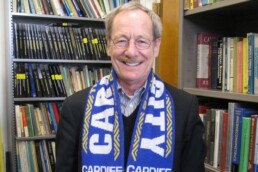
Geoffrey J. Hewings
Urban and regional planning, econometric modelling of regional economies, and impact studies.
Urban and regional planning, econometric modelling of regional economies, and impact studies.
Professor Geoffrey J. Hewings is Director of the Regional Economics Applications Laboratory (REAL) at the University of Illinois at Urbana-Champaign, and a Professor in the departments of geography, economics and urban and regional planning. He has authored and co-authored 10 books and over 100 articles and book chapters. REAL prepares the Chicago Business Activity Index, a monthly forecasting index for the metropolitan economy, as well as a monthly assessment of the region’s employment data. Over the past decade, REAL has conducted a number of impact studies on the Chicago, Illinois, and Midwestern economies – for example, the Monet Exhibition, the Democratic National Convention, high speed rail, international tourism and the role of exports on occupational demands.
Prior to joining the University of Illinois in 1974, Dr. Hewings held appointments at the University of Kent (England) and the University of Toronto (Canada). He has been a visiting professor at the University of Queensland (Australia), Bar Ilan University (Israel), University of Indonesia, Nankai University (China), Kagawa University (Japan) and the Universidad Catolica del Norte (Chile).
Areas of Research:
His major research interests lie in the field of urban and regional economic analysis with a focus on the design, implementation and application of regional economic models. He has devoted considerable time to the way in which these models might become useful in policy formation and evaluation. In addition to the continuing development of regional econometric-input-output models for a number of US states and metropolitan areas, Hewings is working on several modeling projects in Brazil, Colombia, Japan, Korea and Indonesia. Recent work in the Midwest, Brazil and Korea has focused on linking regional macro models with transportation network models to explore impacts of unexpected events (earthquakes), expansion of transportation infrastructure and the impacts of port efficiency. At the metropolitan scale, attention has been directed to the estimation of intra-metropolitan flows of goods, people, income and consumption expenditures within the Chicago region to measure the changing degree of interdependence. Theoretical work remains directed to issues of economic structure and structural change interpreted through input-output, social accounting and general equilibrium models. The issues of ageing, immigration and general demographic challenges to development have been explored in a series of Discussion Papers.
Education:
B.A. University of Birmingham (UK)
M.A., Ph.D. University of Washington (Seattle).